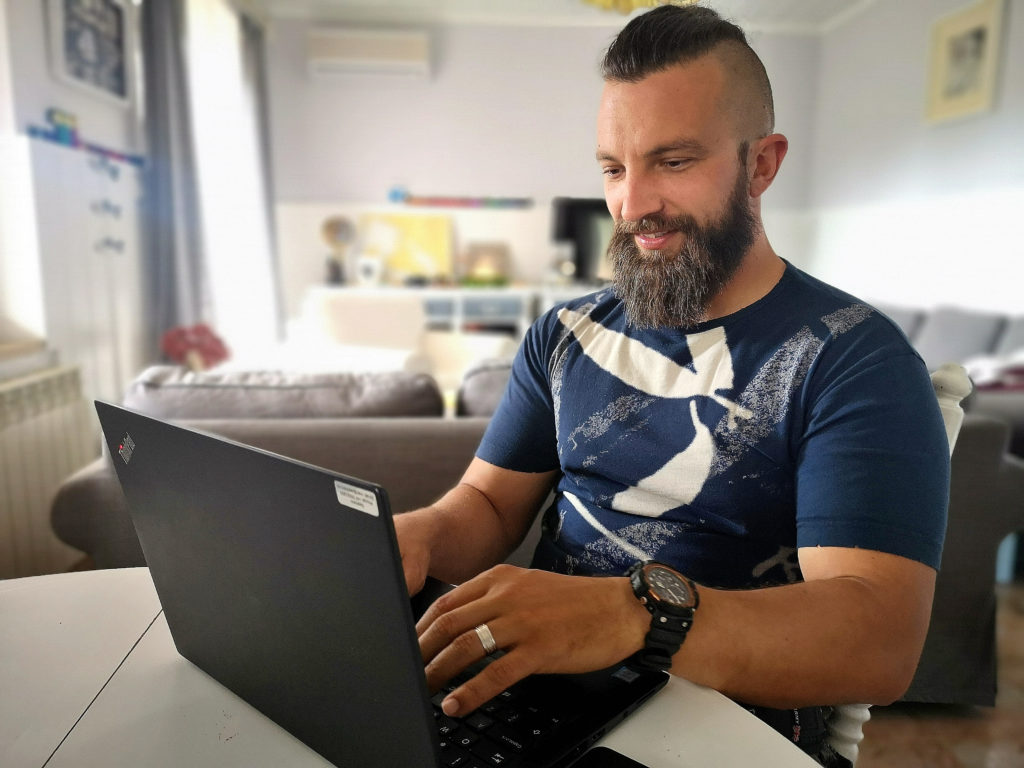
Ready
WORKING FROM HOME: Vedran Zadnik acts as link between the vessel, operations and the terminal personnel to improve operations and processes related to loading and discharging a chemical tanker. Improved planning by all those involved in the operations is beneficial for all parties, he says. (Photo: Martina Zadnik)
“Of course, there will always be room for improvements. We have identified many areas where we can optimise,” Zadnik says.
Optimising
A port stay starts long before the vessel is alongside quay. The key word is planning. “The crew on board plans all the operations they have to perform at the terminal. Once the ship is alongside, these operations will go smoothly if all aspects have been planned. However, that is unfortunately not always the case. Sometimes, the vessel has to wait alongside for various reasons. So, what I do is to act as the link between the vessel and the terminal personnel. In cooperation with the Officer on board,
we plan the whole loading operation together. We have a planning tool which tells us the best combination of packages to be loaded or discharged.
We send the plan to the terminal personnel and discuss it with them. As soon as the plan has been accepted by all parties, it can be implemented. And it is always accepted. We first port where we implemented our project was Huelva, and we can already see that we spend less time in that port now. We have achieved excellent results together,” Vedran Zadnik concludes. “There will always be room for improvements, but we are on the right track. We are making changes and improving.”
Safety
You might think that speeding up these processes would have a negative impact on safety, but Vedran Zadnik denies this. “Absolutely not. Safety comes first. No doubt. The project is not about finding short-cuts or by-passes. If we can manage a port stay according to a good plan, where everybody involved knows his place and time, this increases safety and we save time and improve results at the same time.”
Agent
“The agent is involved in the project and the operations. The agent helps by providing the necessary documents in time and is also involved in this project. They are in contact with the supplier and personnel involved in the loading operation. In general, we are always in close contact with the agent. He is our local representative.”
Huelva – and others
“You have been seeking for and cooperated with CEPSA’s terminal in Huelva. What has their response been?”
“Their response has been very positive. From their point of view, they are also keen on saving time, which means that they can free up berth capacity and improve terminal efficiency. Our cooperation with them has been excellent and very fruitful!”
Huelva is the first port with which Vedran Zadnik has cooperated. “I’m still involved there. But we are looking for other ports so we can transfer the experience we have gained here. We are experiencing significant interest in our findings and improvements,” Vedran says from his home office outside Rijeka. “It is nice to work from home, but it is even better to work on site, in Huelva!”
Savings
“You mentioned results: How many hours have you saved, so far?” “We are saving quite a lot of time and close to the goal we set prior to starting this project, compared to what we achieved before we started to work systematically on this. There are of course still some variations, and we still see the potential to optimise the loading process. But the improvements are visible and documented by figures – that is a fact.”
Potential identified for even more improvements
We are a learning organisation, and the Huelva project is generating valuable knowledge that is very useful for our loading and discharging operations in general,” says Gunnar Solberg, Operations Manager, Seatrans Chemical Tankers. “We are delighted with the great results Vedran Zadnik has achieved. In addition to his personal skills, we recognise with the benefits of his experience from years onboard Trans Adriatic as 2nd and Chief Officer. He has advanced knowledge of what this is all about. And the whole idea with this project is to improve and ensure best practices are shared between our vessels, but also with other terminals where we load/ discharge. The key message is good planning, and that means one good plan for both the terminal and the vessel. The results we have achieved are very motivating for further work on this programme.

